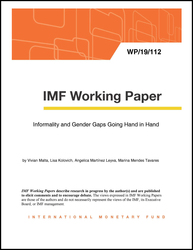
Informality and Gender Gaps Going Hand in Hand
In sub-Saharan Africa women work relatively more in the informal sector than men. Many factors could explain this difference, including women’s lower education levels, legal barriers, social norms and demographic characteristics. Cross-country comparisons indicate strong associations between gender gaps and higher female informality. This paper uses microdata from Senegal to assess the probability of a worker being informal, and our main findings are: (i) in urban areas, being a woman increases this probability by 8.5 percent; (ii) education is usually more relevant for women; (iii) having kids reduces men’s probability of being informal but increases women’s.
Publication date: May 2019
ISBN: 9781498314718
$18.00
Add to Cart by clicking price of the language and format you'd like to purchase
Available Languages and Formats
| English |
Prices in red indicate formats that are not yet available but are forthcoming.
Topics covered in this book
This title contains information about the following subjects.
Click on a subject if you would like to see other titles with the same subjects.
Informal Economy , Gender Gaps , sub-Saharan Africa , Senegal , , gender gap , formal sector , informal employment , informal worker , probit
Summary
Copyright © 2010 - 2026
Powered by:
AIDC



